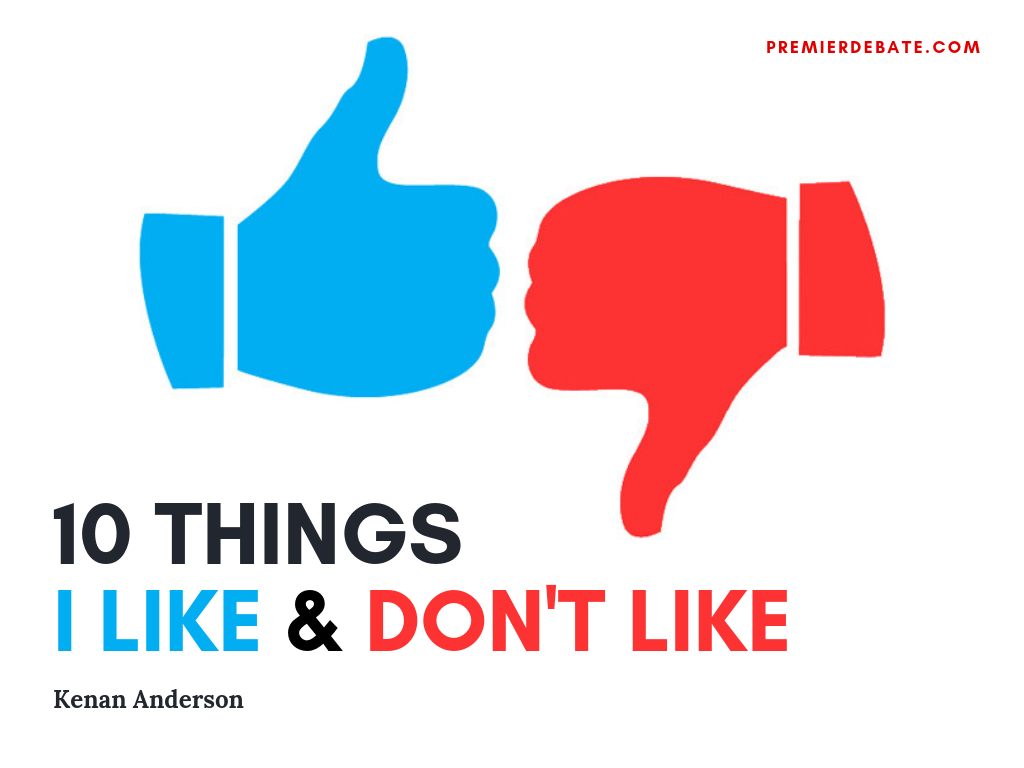10 Things, Super Early Jan/Feb Edition (Bob Overing)

The Jan/Feb 2019 topic is here! Resolved: The United States ought not provide military aid to authoritarian regimes. This post covers some of the likely strategies and options for debaters of all stripes. I haven’t done a full deep dive into the literature yet nor seen any rounds on the topic, so these are preliminary takes. As always, add a grain of salt to each thing and enjoy!
#1 This Topic is an Anomaly
We haven’t had a foreign policy resolution that specifies the United States in ages! Counting only the first three topics of the year (the most debated ones), this may be the first U.S. foreign policy topic since Jan/Feb 2009, which was my novice year! You could count compulsory national service (Sept/Oct 2017) or due process for those accused of terrorism (Sept/Oct 2012), but both of those are domestic policies with international implications, not squarely foreign policy actions. Similarly, we’ve had foreign policy topics with vague actors that /include/ the U.S. like “wealthy nations” (Nov/Dec 2017) and “states” (Sept/Oct 2010) but no such U.S.-specific resolutions in a decade.
If you’re like me, you think U.S.-centric debates are better than vague, unlimited actors, and you like foreign policy because domestic topics overwhelmingly predominate in LD. So this resolution is as abnormal as it is wonderful.
#2 Impacts
As much as I like weighing the injustices of the CJS against kritiks every single round forever and ever, I also like having a topic with credible impacts. Many students I judge and coach simply do not know how to policy debate. How often do you need an advantage counterplan when the topic is as small as right to know or college speech? When do you get to do real impact weighing on those topics? Disad turns case analysis? Politics disads with real links? Impacts other than ‘Trump is bad’? If you’re not doing these things regularly, you’re not practicing the skills you need to do policy debate well, which hurts when we get a real policy topic or for debaters who anticipate debating policy in college. For non-seniors, treat this topic as an opportunity to hone those skills!
#3 Kritik Diversity
Foreign policy topics invite us to read imperialism, colonialism, global neoliberalism, security, fem/gender Ks of IR, etc. These can be a heck of a lot more specific on this topic than the generic Agamben, cap, or afropessimism kritiks round after round. The links will be tougher since the aff is decreasing or eliminating aid rather than increasing it, but these are still good options, especially in conjunction with good case debate. I really hope debaters wade into these lit bases. (But I’m not holding my breath…)
On the aff, I expect to see the very predictable imperialism/colonialism position about America’s use of aid to democratize and manage foreign states, especially those it deems “authoritarian,” “terror”-sponsoring, or otherwise insufficiently “Western.” A completely different angle for K affs is to interpret “military aid to authoritarian regimes” to concern militarization of domestic police forces. There will be a couple of teams reading these affs at Blake and CPS, and debaters reading topicality should be prepared to defend the value of debating foreign policy (and perhaps its value for discussing domestic race relations as well).
#4 “Ought Not” and Side Bias/Skew
We haven’t had an “ought not” topic since Jan/Feb ’17 and before that, Sept/Oct 2010! When I was debating, we had a few “ought not” topics, and the conventional wisdom was that it made things easier for the aff.
I’m not sure that’s true. The burden of inherency requires the aff isolate existing military aid in the status quo that must be removed, but many legitimate counterplans could modify, reduce, or eliminate that aid in ways that totally eviscerate aff advantages. Affs need to be crafty in running advantages that don’t have strong counterplan ground against them or perhaps even be prepared to read an add-on against these counterplans.
On the other hand, the neg’s K ground is definitely worse than if the resolution were a positive requirement to provide military aid to authoritarian regimes. It’s also worse than usual because there will be a plethora of plan affs for which negs should have specific links. Perhaps this advantages the aff overall since it’s a k-heavy metagame, and only some of the best k debaters will adapt accordingly.
#5 Plans: “Ought Not” and “Authoritarian Regimes”
Again, we’re saddled with a vague grouping of nations, which strengthens T arguments that effectively amount to ‘plans bad’. The Wording Committee will never say “provide aid to one or more of the following states…” so this is about as good as it will get. They should consider blocks of countries such as the UN Security Council or BRICs for future resolutions.
Does “ought not” mean never? The phrase sounds strong, but “you ought not kill” is true even if there are exceptions.
I suspect Nebel and/or his acolytes will say something about a generic reading of the resolution. I.e., “ought not” means “generally ought not” or something to that effect. I am not excited to see contrived readings of “ought not” used in this way; perhaps those inclined will cabin their anti-plan interpretations to the phrase “authoritarian regimes” instead.
As is often the case, the generic reading kills much of what makes this topic literature great. Specific details about specific authoritarian regimes and their political climate can affect whether the U.S. ought to provide aid. For this reason, much of the literature I’ve seen using the resolution’s wording does not defend general or total abolition of military aid to authoritarian regimes. I’d bet the percentage of literature on this type of aid that defends the general principle is fairly low.
If that’s true, how do anti-plan folks expect example-laden debates to go down? How does one go about proving an example on either side is generalizable or not? Can any disad be de-linked because most of the time its scenario isn’t true? These sound pretty boring relative to debating the merits of aid to specific regimes. They’re also not debates our students typically practice, and they encourage squirrely one-liners that are functionally NIBs (e.g. “Egypt not generalizable; next”). I’ve written this question in several different ways over the years and haven’t heard a response from the other side.
Negs will argue there are many many authoritarian regimes the aff could choose from, i.e. limits. But those are functionally and textually limited by (1) inherency (aid must exist or be imminent), (2) “military” since aid must go to a military purpose and can be narrowly defined, and (3) advantage areas since tiny affs will often lose to big generics like politics. On top of that, plan debaters should argue that generics decimate consequentialist debate and force framework or k debate, which was already available at the same quality.
We’ll definitely see some T-‘x country is not an authoritarian regime’ and T-‘regimes means two or more.’ These are fairly weak in most cases, and since the resolution is broad enough, I don’t see many affs really pushing the envelope with their selection of aid recipients.
For debaters who want to avoid most of these T debates and still read plans, defending a mechanism like eliminating the Foreign Military Financing Program (which provides something like 90% of aid to several authoritarian regimes) might fit the bill. I don’t yet know if there are good enough solvency advocates.
#6 Perceived Tension Between Policy Specification (Actor/Mechanism) and Philosophy
A lot of folks online seem to treat this as a policy resolution and hence inimical to moral philosophy ground. That’s pretty silly. Would it be more “philosophical” if the resolution said “Resolved: It is morally impermissible for just governments to provide military aid to unjust governments”? No, it is not more “philosophical,” and I strongly believe it is worse for framework ground than the resolution we have. Plus, to the extent every theory debate (read: spec) trades off with framework debate, philosophy-inclined debaters should rejoice.
This topic also makes viable many under-utilized LD frameworks if debaters choose to be a little more creative. Realism vs. cosmopolitanism could make a comeback. Kantian IR theory or international distributive justice could be spicy. Hobbes and libertarianism get better, and international law frameworks might have real offense this time around. This is seriously good stuff, but debaters need to push their own boundaries a bit to find it.
#7 “Ought Not” and Permissibility
One quirk of “ought not” topics is that interest in moral permissibility could spike. Consider that “it is morally permissible for A to X” disproves “A ought not X” but does not disprove “A ought to X.” Of course, many debate relevant permissibility arguments would prove “X is merely permissible for A” and hence disprove “A ought to X” as well, but many do not. Given a particular interpretation of “ought not,” any neg argument denying side constraints could do the trick. This is a boon to framework and tricks debaters on the neg and an under-discussed and under-theorized aspect of topic wordings.
#8 Shift Disads
I’m super excited for a number of neg arguments that can be grouped under the label ‘shift.’ Cutting military aid shifts to hard power such as sanctions or direct U.S. military intervention. Cutting military aid shifts U.S. support to other types of aid. Cutting military aid causes other countries to fill in. Cutting military aid causes the private sector (either giant defense companies or private military firms) to fill in.
Many of these will be excellent case turns and some can be full-fledged disads. The top debaters will master them quickly, and I wouldn’t be surprised to see some straight refutation debates on this topic. Do this well, and you’re looking at very high speaker points from me.
#9 International Relations, Counterplans
How does aid to country X affect their or America’s relationship with country Y? How does aid affect their vote in the UN? How does it affect treaty negotiations? These will make difficult to turn advantage areas and great disad/counterplan debates. If a couple plans become popular, that may justify what many (in LD) consider to be abusive counterplans like consult or agent CPs.
These strategies are a lot more engaging and exciting than what I expect to see: counterplans that PIC out of all of the aff but for one or two regimes. These are sad but not for the reason you’d think. We should have example-laden debates, but if the neg can regularly read these PICs, it means affs are forgoing their opportunity to specify. Don’t let this be you! Specify early and often, and don’t count on ‘PICs bad’ theory to save you. I hope I don’t feel compelled to revisit this in my next 10 things, but given what we saw on plea bargains, I may be let down.
For debaters inclined to read very country-specific neg strategies against general affs, there are options beyond “no aid except X” PICs. Any counterplan to provide military aid to a regime not currently receiving aid will do the trick. These counterplans force the 1AR to have very specific offense and reward the neg for quality research without the unfairness of the PICs discussed above.
#10 Trump and Oppression
This topic is so meaty that I’m extremely optimistic that we’ll see a decline in generic “Trump is bad” impacts. Trump causes extinction and a laundry list of oppressions has been argued for three years, and it is definitely one of the most boring recycled impact scenarios (though “scenario” is generous). Opponents are hesitant to impact turn it, and I’m not sure I’ve ever seen robust impact defense either. Trump will feature in these debates, bigly, but I’m hoping for a little more nuance this time around.
Similarly, the generic human rights oppression aff will be viable, but with a little elbow grease, debaters will find better and still plausible advantages. Both big stick and human rights is also a great option.
Just under a year ago I declared “Utilitarianism affs are dead” when I found at most four util affs out of seventy-nine at Blake and CPS. I graded these four A, B, C, and C on their “util-ness.” I expect this to change radically this year. I predict a tenfold increase in the As and Bs, so at least 20 solid util affs in elims of Blake and CPS this month. Wouldn’t that be exciting?


